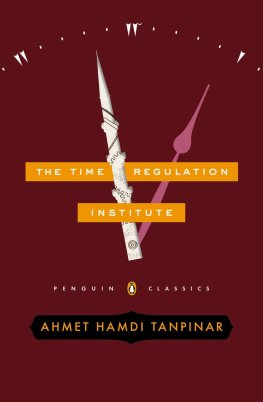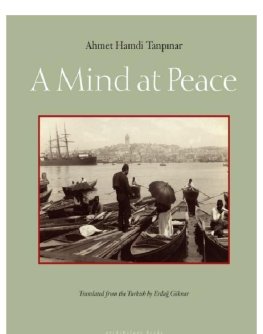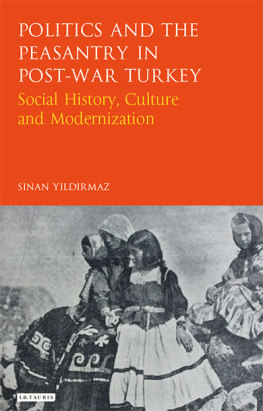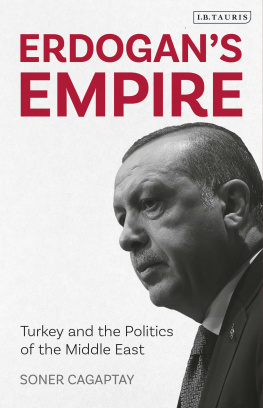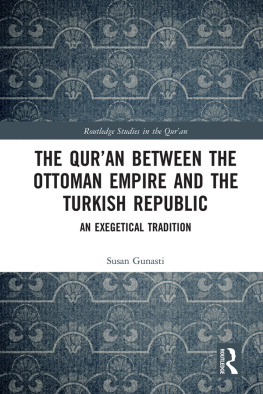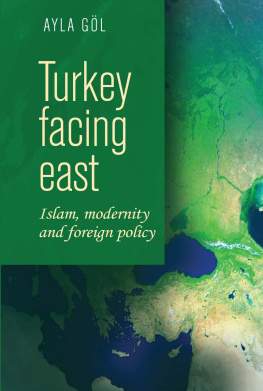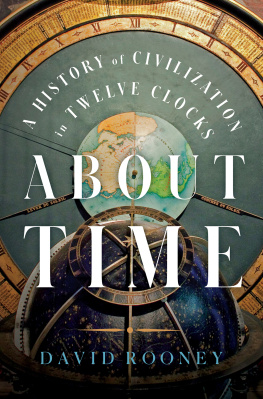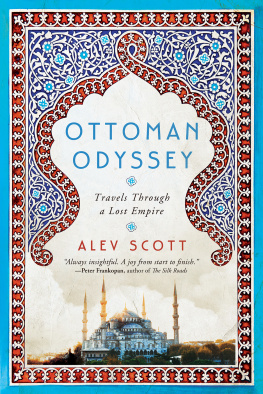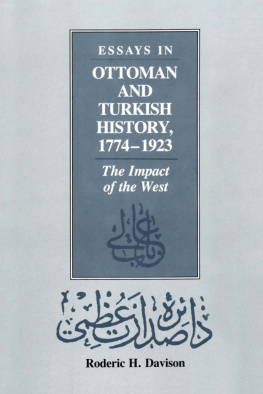Ahmet Hamdi Tanpinar
The Time Regulation Institute
Orhan Pamuk has called Ahmet Hamdi Tanpnar (190162) the greatest Turkish novelist of the twentieth century. From the evidence of this novel and Huzur (A Mind at Peace) Tanpnar may have a strong claim to this distinction.
Born and educated in the old Ottoman Empire, Tanpnar was clearly a major artist and thinker a strong influence, among other Turkish writers, on Pamuk himself. However, it is difficult for the anglophone reader to verify Pamuks judgment. Translations from twentieth-century Turkish literature are scarce. The unique history and culture of modern Turkey is not immediately familiar to readers in English: how, for instance, in the 1920s the Muslim-majority Ottoman Empire was radically and forcibly reorganized into a secular republic by Mustafa Kemal (better known as Atatrk), and everything in its culture, from the alphabet to headwear and religion, hastily abandoned in an attempt to emulate European-style modernity.
There is another, even steeper, hurdle to understanding Atatrks drastic cultural revolution: this is the basic assumption, shared by many Western readers, that societies must modernize and become more secular and rational, relegating their premodern past to museums or, in the case of religion, to private life. This idea that modernization makes for enhanced national power and rapid progress and helps everyone achieve greater happiness has its origins in the astonishing political, economic, and military successes of Western Europe in the nineteenth century. It was subsequently adopted in tradition-minded societies by powerful men ranging from autocrats such as Atatrk and Mao Tse-tung to the more democratic-minded, if paternalistic, Jawaharlal Nehru.
They felt oppressed and humiliated by the power of the industrialized West and urgently sought to match it. It did not matter that their countries lacked the human material self-motivated and rationally self-interested individuals apparently necessary for the pursuit of national wealth and power. A robust bureaucratic state and a suitably enlightened ruling elite could quickly forge citizens out of a scattered mass of peasants and merchants, and endow them with a sense of national identity.
But there was a tragic mismatch between the intentions of these hasty modernizers and the long historical experience of the societies they wanted to remake in the image of the modern West. No major Asian or African tradition had accommodated the notion that human beings could shape a meaningful narrative of evolution, or that the social order, too, contained the general laws discovered by modern science in the natural world, which, once identified, could be used to bring about ever-greater improvements the potent and peculiarly European prejudice that gave conviction to such words as progress and history (as much ideological buzzwords of the nineteenth century as democracy and globalization are of the present moment). Time, in fact, was rarely conceptualized as a linear progression in Asian and African cultures. Nevertheless, scientific and technological innovations, as well as the great triumphs of Western imperialism, persuaded many Asians that they too could rationally manipulate their natural and social environment to their advantage.
As evident in Iran under Reza Pahlavi, as well as in Mao Tse-tungs China, these single-minded authoritarian figures, who saw themselves as bending history to their will, ended up inflicting immense violence and suffering on their societies. The outcome was always ambiguous (as is now clear in Turkeys own turn to a moderate Islamism after decades of a secular dictatorship and the recent embrace by Chinese Communists of a worldview they previously scorned: Confucianism). For as Dostoyevsky warned, No nation on earth, no society with a certain measure of stability, has been developed to order, on the lines of a program imported from abroad.
Dostoyevsky was speaking from the experience of nineteenth-century Russia, the first society to be coerced by its insecure rulers into imitating the West: the result was uprooted and superfluous men, such as those he and his compatriots wrote about, bloody revolution, and a legacy of authoritarian rule that persists to this day. Japan had then followed Russia and preceded Turkey in trying to do in a few decades what it took the West centuries to accomplish. Japanese writers in the last century from Natsume Sseki to Haruki Murakami have attested to the profound psychic distortions and widespread intellectual confusion caused by the Japanese attempt at Westernization that peaked with the rise of Japanese militarism and, after the incineration of Hiroshima and Nagasaki in 1945, turned Japan into an American client state. Novelists as varied as Junichir Tanizaki and Yukio Mishima sought a return to an earlier wholeness. Tanizaki tried to recreate an indigenous aesthetic by pointing to the importance of shadowsa whole world of subtle distinctions banished from Japanese life by the modern invention of the lightbulb. Mishima invoked, more dramatically, Japans lost culture of the samurai. Both were fueled by rage and regret that, as Tanizaki wrote in In Praise of Shadows, we have met a superior civilization and have had to surrender to it, and we have had to leave a road we have followed for thousands of years.
In recent times, Orhan Pamuks fiction has, as he writes in his novel The White Castle, eloquently attested to the alienation wrought by the transformation of people and beliefs without their knowledge and the pathos of witnessing the superiority of others and then trying to mimic them. But what Tanpnar identified as a peculiar fatality of Turkish history was not particular to his or Turkeys experience. Both Chinas Lu Hsn and Indias Rabindranath Tagore confronted what Tanpnar described as the awful thing we call belatedness; that is, the experience of arriving late in the modern world, as naive pupils, to find ones future foreclosed and already defined by other peoples past and present. There is much literary, historical, and sociological evidence attesting to the spiritual and psychological as well as political damage of top-down modernization. Still, most commentators in the West continue to insist that non-Western societies, especially Islamic ones, ought to quickly become modern: in other words, be more like the West. These reflexive and unexamined prejudices emerge, understandably, from the exceptional experience of Western Europe and America. But at least some of them have to be overcome before we can understand the nature and extent of Tanpnars achievement his sense of foreboding and loss, and his evocation, in particular, of the melancholy, or hzn, of those doomed to arrive late, and spiritually destitute, in history. It requires sympathy with the trauma of writers who witnessed the devastation of their familiar landmarks, for whom the new world conjured into being by their great leaders remained agonizingly meaningless, denuded of the consolations of tradition and heaving with the tawdry illusions of modernity. It requires understanding that though Tanpnar knew his European literature his Baudelaire, Gide, and Valry the anguish, as Pamuk writes, that sustains all of his work arises from the disappearance of traditional artistry and lifestyles.
The anguish and the resentment of being in permanent tutelage to Europe was all the more keen for Tanpnar, who had grown up in the Ottoman Empire and knew something of the old ways before they were violently suppressed by Atatrk. He grew up, for instance, with the Ottoman music and poetry that Atatrks cultural engineering made inaccessible to later generations. His teacher was Yahya Kemal Beyatl, a much-loved Turkish writer, who authored nostalgic epics relying on traditional Persian

